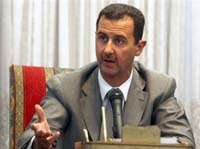Syria Seeks Opportunities to "Exert Pressure" on Israel
Syria’s aspirations to play a more important role in Middle Eastern affairs explain the recent invitation extended to the Russian president, Dmitry Medvedev, for official visit. Medvedev arrived in Damascus on 10th May to discuss the situation in the Middle East and questions concerning the resolution of the Arab-Israeli conflict with his Syrian counterpart, Bashar Assad.

Photo: Syria Seeks Opportunities to "Exert Pressure" on Israel
During their meeting, the Syrian president, appraising Israel’s current position, asked that Russia exert pressure on her - a request he made as if speaking for the whole of the Arab world. According to Assad, Arabs are ready to conclude a full-scale peace with Israel, but find attempts to do so are hindered by her intractability. He claimed that Israel continues her occupation of Arab territory and poses a constant threat to Arab countries, behavior he regards as enabled by the support of Western powers.
The problem of the Iranian nuclear program was also touched upon during the discussion. Representing the position of the Islamic Republic, Assad stated that the only possible solution to this problem lies in diplomacy and discussions; if the opposing route of military intervention is taken, it will lead to catastrophe “all over the world”.
Russia Today: Syria: We'll host Russian missile system
He also called on Russia to make her contribution to the transformation of the Middle Eastern region into a nuclear-free zone, by which he did not mean only Iran. If we recall the repeated - but unsuccessful - efforts of Iran, Egypt and other Arab countries to attract the attention of the world community to the Israeli nuclear program, it is clear which country Assad actually had in mind.
In a word, Syria is positioning herself as an influential state whose opinion commands respect both in the Middle East and beyond its borders. To what extent are such pretensions legitimate? Sergei Demidenko, expert on the Arab world at the Institute of Strategic Appraisal and Analysis, shares his opinion with Pravda.Ru:
“Today, Syria is attempting to play an active role in the Arab world, dreaming of dominance; this, however, is a position it is not destined to achieve. Syria has always been, and will always be, in the shadow of its more rich and influential neighbors. In contrast to the majority of other Arab countries, Syria does not possess significant supplies of energy resources. During the 1950s and 60s, it was eclipsed by Egypt; then it was Saudi Arabia, which has played a significant role in the shaping of the Syrian budget. Such pretensions are thus clearly untenable. Now Syria is becoming more and more dependent on Iran, and, by trying to become a mediator between the world community and the Islamic Republic, is attempting to prove that it has significance in its own right.”
“How are such attempts perceived in the West?”
“Western countries still don’t see Syria as a potential partner. One of the reasons for this is Damascus’ official support of the movement “Hezbollah”, which in the USA is considered to be a terrorist organization. Syrian authorities, meanwhile, will never retract this support. They fear the loss of Syrian influence in Lebanon that would result, something that Damascus, dreaming of regional dominance, cannot allow.
It was not long ago, under George Bush, that Syria was declared a part of the “Axis of Evil”, and singled out as the next possible target of forced democratization. True, having come up against strong resistance in Iraq, the USA was forced to consider Syria’s influence on the situation in this country; the term “Axis of Evil” ceased to be used in discussions with Syria. Syria did not, however, manage to rid itself of its reputation as an ally of terrorist groups.
The West does not intend to recognize in Syria an influential power, because the USA and Europe are uncertain of the stability of the regime in Damascus.
“Do the Islamists pose a threat to Asad? His father, after all, almost completely destroyed them…”
“On one level, this is true. Yes, all previous attempts on the side of the fundamentalists to stir up revolt against his father’s regime were harshly suppressed, with several tens of thousands of people simply being shot.
But now, and for the foreseeable future, the country is not threatened by an Islamist coup. Assad, realizing the danger posed by Islamic radicals, is trying to instill Islam from above. He travels around mosques, demonstrating his belief in Islam values, and has abolished the total control of mosques brought in by his father.
“Assad has asked Russia for protection from Israel. What kind of help can he expect to receive?”
“At best, it will be a supply of the usual consignment of munitions. But, as experience has shown, this will be of little help to Syria. All prior conflicts with Israel have ended badly for her: take, for example, the loss of the Golan Heights in 1967.
“Could these be returned?”
“This is not a possibility in the near future. In Israel, the forces that are currently in power are not inclined to such concessions – even less so in this case, since control of the Golan Heights automatically means control of the Sea of Galilee, Israel’s main source of water. In Syria, meanwhile, foreign policy is built on the return of the Heights. In such circumstances, compromise is simply not possible.
“How will mutual relations develop between Syria and Russia in the future?”
“If in previous years our cooperation has largely been evidenced in military and technological partnership, the situation may now change. Today Syria is interested in modernization. She needs Russian investment for the development of advanced technological sectors, which Bashar Assad supports. On a political front, though, Russia can no longer occupy the powerful position taken by the USSR.
Sergey Balmasov
Pravda.Ru
Read the original in Russian



